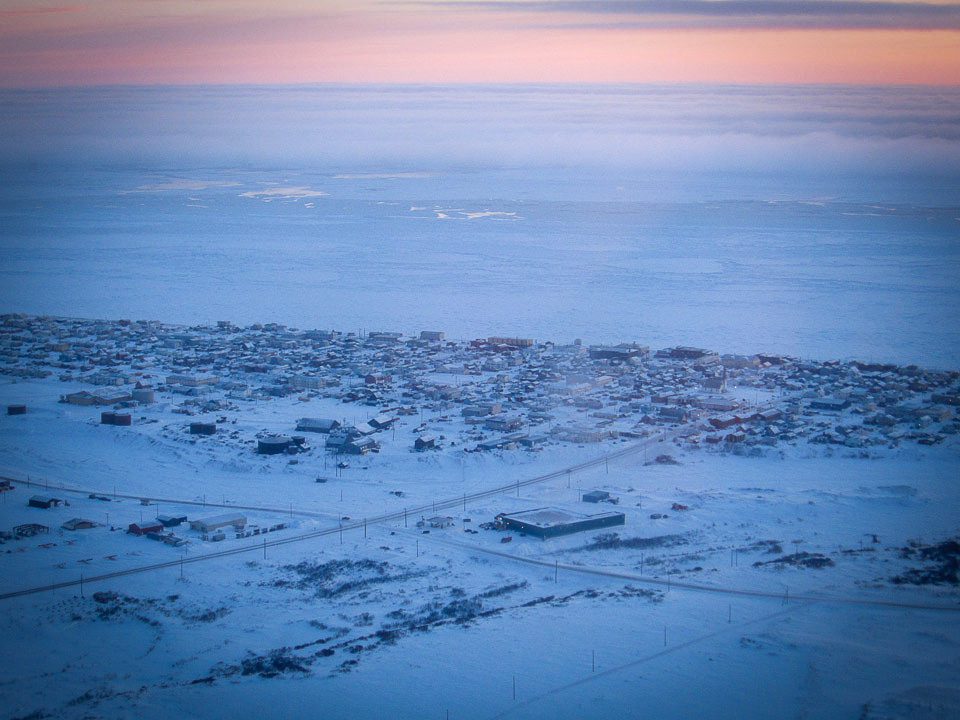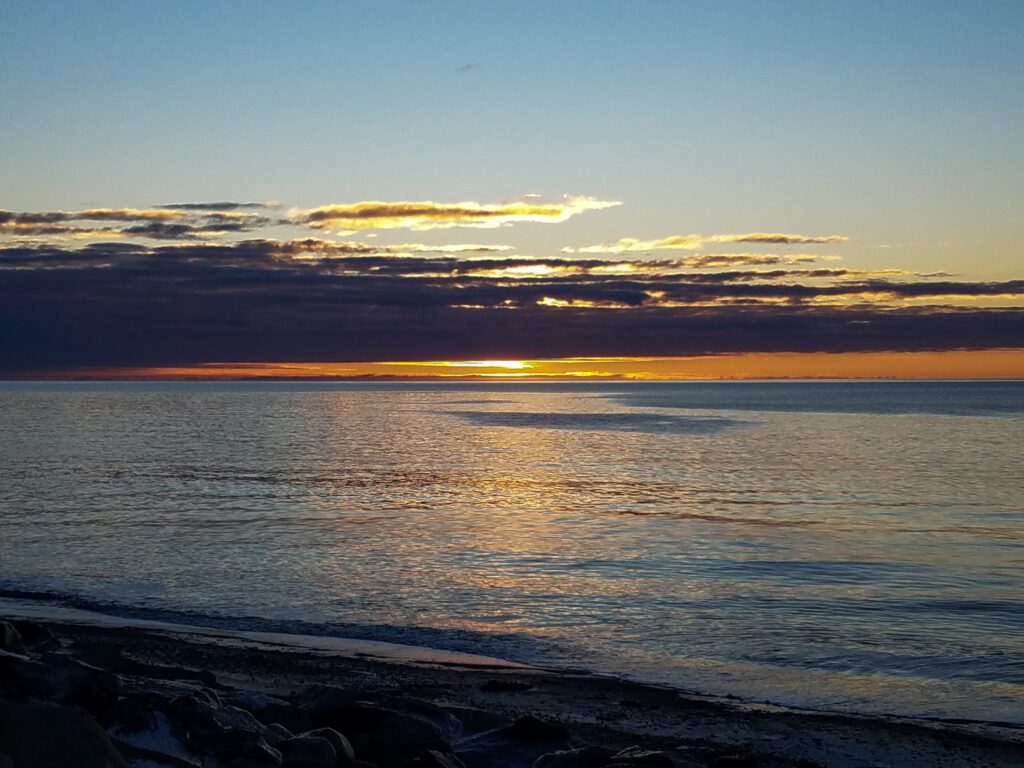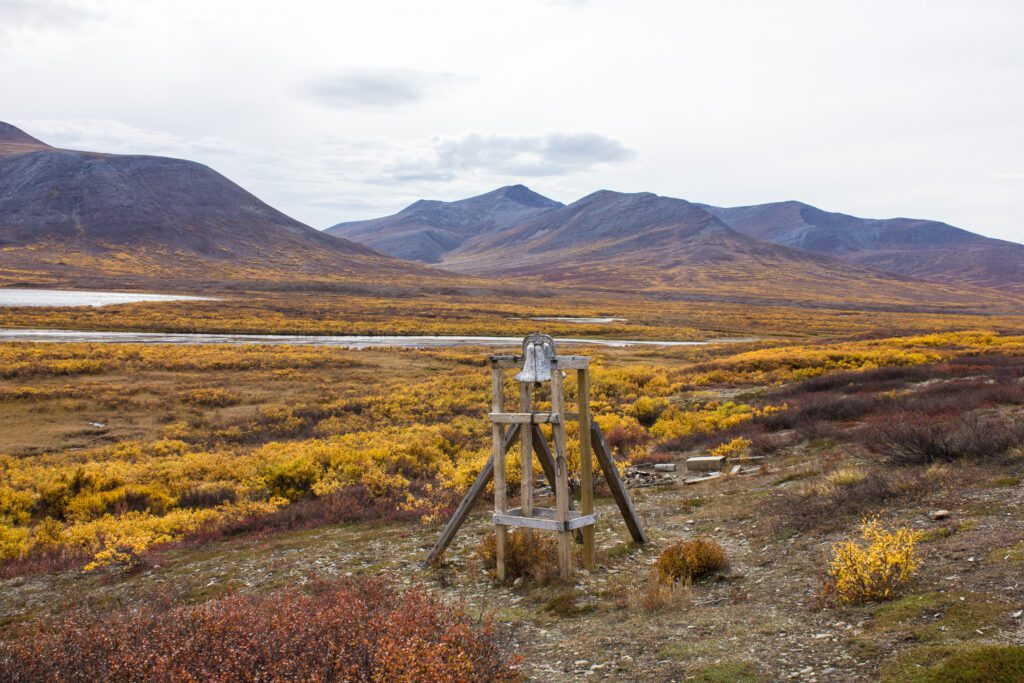Finding enough words has never been a problem. For me, learning when less language does more work is the ever-present challenge. Not using needlessly long words, hitting the upper-page limit on papers, or interrupting to make a point—that’s the stuff I try to watch for. With mixed success.
This is my last blog post as a KNOM volunteer, and rather than labor to “say it all,” I am going to take a lesson from my news department training under Laureli and Matthew, and aim to simplify the scope of what I want to say. There aren’t enough words for me to explain what this year has meant to me. It would take too long, sprawl too wildly, and be preemptive—since the impression left on me will morph and warp for years, if it even calcifies at all.
![]() Nome, KNOM, the Bering Strait Region, the people I have been lucky enough to know and the work I feel lucky enough to have done changed me. I came here chasing shadows—half escapist fantasies from New York City misery, half pragmatic calculus I’d get job training in journalism. No part of me expected to like it so much, to be cajoled into new ways of thinking, get grounded in values that had earlier been abstracts and now feel vital.
Nome, KNOM, the Bering Strait Region, the people I have been lucky enough to know and the work I feel lucky enough to have done changed me. I came here chasing shadows—half escapist fantasies from New York City misery, half pragmatic calculus I’d get job training in journalism. No part of me expected to like it so much, to be cajoled into new ways of thinking, get grounded in values that had earlier been abstracts and now feel vital.
Here’s one example, although there are many. I came to Alaska excited to hunt. I thought it would be cool to watch an animal turned into food. Because I’d never seen that most basic process from start to finish. What that seed has since budded into is a respect, humility, and delight in subsistence activities. The hunting, it seems to me a year later, is one small-but-crucial piece in a much larger process, mindset, and lifestyle. I got to hunt a few times, but I also got to pull a net, fish rod-and-reel, fillet and strip, pick berries, drop a crab pot, pluck a duck, pick greens, scour totes, haul water—the web of activities around self-provisioning I’d not even known about, much less known to value. Did I shoot a moose? No, absolutely not. But I did gain a large measure of respect for the immense amount of work and knowledge it takes to do that responsibly and capably. What’s more: I liked it–liked that they were chores that produce tangible results, liked feeling sore afterwards, liked getting dirty because there’s no way to stay clean splitting fish heads.
My little forays into foraging and fishing—and how hard they are—were humbling lessons in how much I do not know, most particularly about myself. One reason this year altered me, will continue affecting me, is that my boundaries were tested often and extremely: I was challenged, and learned way more about what I’m capable of. That happened waking up at 6am to cover the news, it happened during those sleepless weeks of Iditarod, it happened crashing on floors in IRA buildings after scrambling til 1am to get news stories in from the field. The KNOM, work-side of things let me test how much I could take on, and I am immensely pleased with how I did.
But thankfully there were ample challenges elsewhere. Getting soaked to the bone from summer rain casting for Cohos—shivering but intent. Bent over a berry-bucket, back aching, hands numb, but wanting desperately to make sure I got two quarts, took advantage of the patch, did my best. Not losing my patience at a cutting table when I couldn’t make my incisions smooth enough. I was encouraged to push myself, and I can do vastly more than I ever expected when I was an anxious mess growing more afraid of the world each week back in the New York City subway tunnels. That has been a gift from KNOM, from Alaska, and from the friends and mentors who put up with my questions, my transplant’s incompetency, my blind enthusiasm.
I do not know what’s next. I know I want to keep reporting, ideally in radio, and in a place where I’m excited to live—not just to work, but to live on my weekends, dig in to, be changed by. Anchorage, Austin, Atlanta—I’m applying for a “next step” all over, pessimistic that what comes next could ever be as good as it is now, but emboldened and affirmed that I can not just get by, but thrive.










